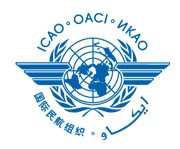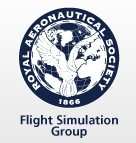Fri, Dec 24, 2010
International Organization Has Previously Published A Similar
Document For Fixed-Wing Aircraft
 Under the auspices of the Royal Aeronautical Society (RAeS),
an International Working Group (IWG) has spent the last 4 years
developing new criteria for the classification and qualification of
civil helicopter Flight Simulation Training Devices (FSTDs), based
on pilot training tasks. The intention is for the International
Civil Aviation Organisation (ICAO) to publish a new volume of the
Manual of Criteria for the Qualification of FSTDs - Document 9625
dedicated to helicopters and its subsequent adoption by civil
aviation authorities worldwide.
Under the auspices of the Royal Aeronautical Society (RAeS),
an International Working Group (IWG) has spent the last 4 years
developing new criteria for the classification and qualification of
civil helicopter Flight Simulation Training Devices (FSTDs), based
on pilot training tasks. The intention is for the International
Civil Aviation Organisation (ICAO) to publish a new volume of the
Manual of Criteria for the Qualification of FSTDs - Document 9625
dedicated to helicopters and its subsequent adoption by civil
aviation authorities worldwide.
The work takes advantage of a similar effort for fixed wing
aircraft which has already been published by ICAO.
The Helicopter IWG has expert international representation from
the industry, including regulators, helicopter and simulator
manufacturers, training organisations, helicopter operators and
users. For the first time, helicopter simulation is being
considered as a separate subject by ICAO. An analysis of pilot
training tasks and licences forms the basis of the new device
definitions, which represents a significant change in approach to
existing processes, with one of the key aims of the work being to
improve access to simulation across the helicopter industry and
thus improve safety.
 The draft of Volume 2 of the new ICAO 9625 Edition 3 document
is intended for submission to ICAO early in 2011. It is available
on the Royal Aeronautical Society’s website. Interested
parties are encouraged to review the material and make comments
using the website tool. The comment period will close on 20 January
2011.
The draft of Volume 2 of the new ICAO 9625 Edition 3 document
is intended for submission to ICAO early in 2011. It is available
on the Royal Aeronautical Society’s website. Interested
parties are encouraged to review the material and make comments
using the website tool. The comment period will close on 20 January
2011.
The ICAO says that the work of the Helicopter IWG is part of the
largest harmonization effort ever attempted in the history of the
flight simulation industry. It is anticipated that achieving an
internationally accepted definition of helicopter FSTDs will have
significant benefits across the industry. The organization contends
that this should:
- Reduce and simplify the administrative burden for
stakeholders.
- Permit a more consistent approach by simulator
manufacturers.
- Provide a clear expression of the suitability of use of
specific FSTDs for the training tasks associated with licences,
ratings, checks, etc. for training organisations and
operators.
- Improve the quality of training and reduce costs.
More News
Its Offerings Are Lighter, Cleaner, and Now Pushing Past 1,000nm on SAF Jet Fuel DeltaHawk’s diesel-powered aircraft lineup has seen incredible upgrades over the last few yea>[...]
The Airplane Experienced A Total Loss Of Engine Power On December 3, 2025, about 1600 central standard time, a Mooney Aircraft Corp. M20K, N57229, was substantially damaged when it>[...]
Make Sure You NEVER Miss A New Story From Aero-News Network Do you ever feel like you never see posts from a certain person or page on Facebook or Instagram? Here’s how you c>[...]
Aero Linx: European Society of Aerospace Medicine (ESAM) As a pan-European, independent forum, it works to promote the safety and health of all persons involved in aviation and spa>[...]
“We are excited to see Wisk achieve this milestone, and I’m so proud of the team that made it possible. The team at Wisk has built advanced technologies across flight c>[...]
 Aero-TV: DeltaHawks Diesel Power Steps Into the Spotlight
Aero-TV: DeltaHawks Diesel Power Steps Into the Spotlight NTSB Prelim: Mooney Aircraft Corp. M20K
NTSB Prelim: Mooney Aircraft Corp. M20K ANN FAQ: Turn On Post Notifications
ANN FAQ: Turn On Post Notifications ANN's Daily Aero-Linx (12.20.25)
ANN's Daily Aero-Linx (12.20.25) Aero-News: Quote of the Day (12.20.25)
Aero-News: Quote of the Day (12.20.25)




